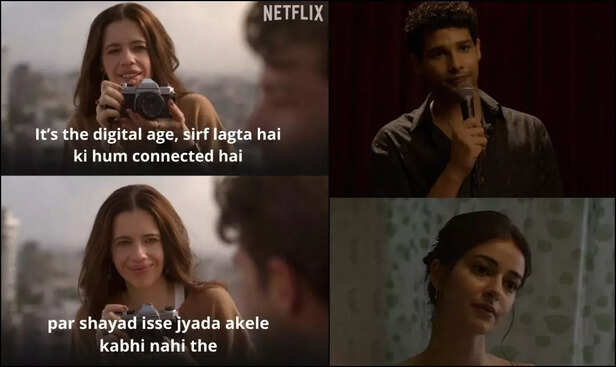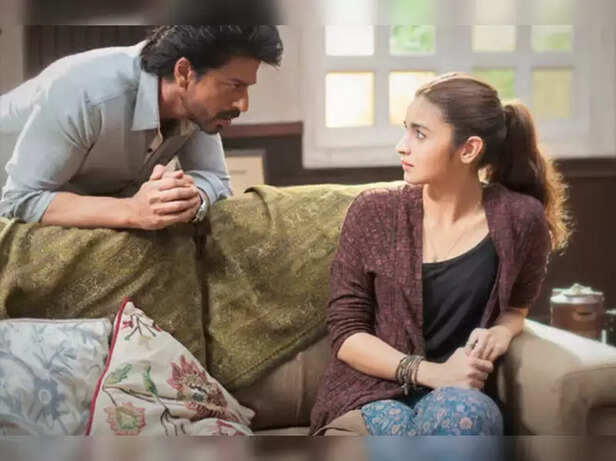Why Does This Generation FEAR LOVE More Than Loneliness?
Nidhi | Jan 31, 2025, 22:43 IST
( Image credit : Times Life Bureau, Timeslife )
Today's generation is lonelier than ever, caught in the paradox of craving connection yet fearing commitment. Imtiaz Ali's observation, "I feel this young generation is lonelier than ever," perfectly encapsulates this crisis. While FOMO (Fear of Missing Out) drives people to stay socially engaged, the fear of dependency keeps them emotionally distant. This article explores the psychological conflict, the societal shifts that caused it, and how it has led to a silent mental health crisis of anxiety, burnout, and emotional exhaustion.
"I feel this young generation is lonelier than ever." — Imtiaz AliWe have more ways to connect than ever before, yet loneliness seeps into our lives like an unshakable shadow. We fear missing out on life’s grand experiences, yet we crave solitude to escape the noise. We want deep, meaningful connections but hesitate to let anyone in. We long for love but get exhausted by emotional labor.
This paradox is not just a modern-day dilemma—it’s the defining contradiction of our generation. Somewhere between the desire to be independent and the fear of being alone, we have built walls instead of bridges. We have normalized surface-level interactions while secretly longing for someone to truly understand us.

We live in an era where social media ensures we are never truly alone—at least not digitally. Every notification, every ‘like,’ every ‘seen’ message gives the illusion of presence. But presence is not the same as connection. We scroll through perfectly curated lives, feeling envious of experiences we are not a part of, yet when given the opportunity, we hesitate to engage meaningfully.
The fear of missing out (FOMO) stems from this very anxiety: the idea that life is happening elsewhere, and we are not a part of it. But is it really? Or are we merely consuming a highlight reel while avoiding our own realities?

On the flip side, when the noise fades, a deeper fear emerges—the fear of being alone. We chase distractions, overcommit to social events, and keep ourselves constantly occupied because silence forces us to confront ourselves. And that’s terrifying.
Being alone in a room with our thoughts feels suffocating because we have been conditioned to seek validation externally. Yet, when we do engage with people, it often feels transactional—conversations become performances, friendships become strategic, and relationships become exhausting negotiations of personal space versus intimacy.
 Today’s generation is torn between two extreme desires—one for unshackled freedom and the other for unconditional love. We crave independence, yet we also want a shoulder to lean on. We want to be heard, but we don’t want to rely on someone to listen.
Today’s generation is torn between two extreme desires—one for unshackled freedom and the other for unconditional love. We crave independence, yet we also want a shoulder to lean on. We want to be heard, but we don’t want to rely on someone to listen.
This push and pull create half-hearted relationships, situationships, and the endless cycle of ghosting, breadcrumbing, and digital flings. Emotional labor feels like a burden, and commitment feels like a trap. But what if the real prison is our own inability to be vulnerable?
Psychologists have long observed the link between social disconnection and mental health struggles. A study from Harvard revealed that loneliness can be as detrimental to health as smoking 15 cigarettes a day. Yet, despite this knowledge, we continue to isolate ourselves emotionally.
We tell ourselves that independence means not needing anyone, but in reality, humans are wired for connection. The more we suppress this need, the more anxious, restless, and emotionally exhausted we become.
 Another modern curse is the overwhelming number of choices. Dating apps present us with endless possibilities, so we keep swiping, convinced that something better is just around the corner. Friendships are measured by social media interactions rather than genuine moments. Careers demand 24/7 hustle, leaving little room for relationships.
Another modern curse is the overwhelming number of choices. Dating apps present us with endless possibilities, so we keep swiping, convinced that something better is just around the corner. Friendships are measured by social media interactions rather than genuine moments. Careers demand 24/7 hustle, leaving little room for relationships.
In a world that tells us we can have it all, making a single choice feels like losing out on infinite possibilities. And so, we hover in the grey area—never fully committing, never fully detaching—always stuck in between.

At the end of the day, neither fear of missing out nor fear of being alone should dictate how we live. The true victory lies in breaking free from both. Life isn’t about chasing moments you aren’t part of or avoiding the stillness of solitude—it’s about existing fully in whatever space you are in, with whoever truly matters.
Because the real tragedy isn’t missing out on fleeting experiences. It’s missing out on deep, meaningful connections—especially the one with yourself.
This paradox is not just a modern-day dilemma—it’s the defining contradiction of our generation. Somewhere between the desire to be independent and the fear of being alone, we have built walls instead of bridges. We have normalized surface-level interactions while secretly longing for someone to truly understand us.
The Digital Age and the Illusion of Connection

kho gaye hum kahan
We live in an era where social media ensures we are never truly alone—at least not digitally. Every notification, every ‘like,’ every ‘seen’ message gives the illusion of presence. But presence is not the same as connection. We scroll through perfectly curated lives, feeling envious of experiences we are not a part of, yet when given the opportunity, we hesitate to engage meaningfully.
The fear of missing out (FOMO) stems from this very anxiety: the idea that life is happening elsewhere, and we are not a part of it. But is it really? Or are we merely consuming a highlight reel while avoiding our own realities?
The Fear of Being Alone: The Other Side of the Coin

Kho gaye hum kahaan
( Image credit : Times Life Bureau )
On the flip side, when the noise fades, a deeper fear emerges—the fear of being alone. We chase distractions, overcommit to social events, and keep ourselves constantly occupied because silence forces us to confront ourselves. And that’s terrifying.
Being alone in a room with our thoughts feels suffocating because we have been conditioned to seek validation externally. Yet, when we do engage with people, it often feels transactional—conversations become performances, friendships become strategic, and relationships become exhausting negotiations of personal space versus intimacy.
The Modern Dilemma: Love, Freedom, and Loneliness

Love Aaj Kal
( Image credit : Times Life Bureau )
This push and pull create half-hearted relationships, situationships, and the endless cycle of ghosting, breadcrumbing, and digital flings. Emotional labor feels like a burden, and commitment feels like a trap. But what if the real prison is our own inability to be vulnerable?
The Psychological Cost: Anxiety, Depression, and the Loneliness Epidemic
We tell ourselves that independence means not needing anyone, but in reality, humans are wired for connection. The more we suppress this need, the more anxious, restless, and emotionally exhausted we become.
The Paradox of Choice: Too Many Options, No Real Decisions

Tum Bin 2 Movie
( Image credit : Times Life Bureau )
In a world that tells us we can have it all, making a single choice feels like losing out on infinite possibilities. And so, we hover in the grey area—never fully committing, never fully detaching—always stuck in between.
Breaking the Cycle: How Do We Find Balance?

Dear Zindagi
- Re-evaluate Your Idea of Happiness: True happiness isn’t about constant stimulation; it’s about contentment. Sometimes, missing out on something external means gaining something internal.
- Redefine Alone vs. Lonely: Being alone is an opportunity to build a stronger sense of self. Loneliness, on the other hand, is the absence of meaningful connection. The two are not the same.
- Be Intentional with Relationships: Instead of maintaining 50 shallow friendships, focus on a few that truly matter. Quality over quantity applies to people too.
- Limit Digital Noise: Take breaks from social media and observe how much of your anxiety is linked to what others are ‘supposedly’ doing.
- Embrace the Uncomfortable: Solitude is a powerful tool if you learn to sit with it instead of running away from it.
Final Thoughts: What Wins?
Because the real tragedy isn’t missing out on fleeting experiences. It’s missing out on deep, meaningful connections—especially the one with yourself.
